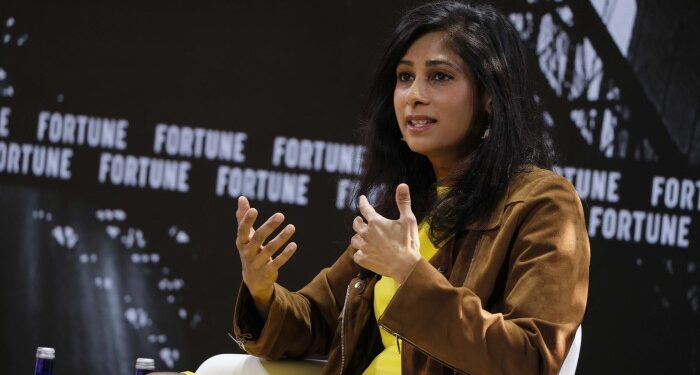Unlock the White House Watch newsletter for free
Your guide to what Trump’s second term means for Washington, business and the world
US President Donald Trump’s trade war presents an even tougher challenge for emerging market policymakers than the Covid-19 crisis five years ago, a top official at the IMF has warned.
Gita Gopinath, the fund’s first deputy managing director, said the unpredictable impact of tariffs on developing economies and global markets would make it particularly difficult for central bankers to support their economies.
In the early stages of the pandemic “central banks everywhere were moving in the same direction in the sense of easing monetary policy very quickly, but this time around the shock has differential effects,” Gopinath told the Financial Times.
“This time the challenge is going to be greater for them compared to the pandemic,” she added.
Federal Reserve policymakers have been signalling they are not ready to lower interest rates until they are sure tariffs will not further stoke inflation. But for emerging markets facing higher US trade barriers, the situation looks “more like a demand shock”, said Gopinath, which means slower inflation and growth.
The situation contrasts with the onset of the pandemic, when central banks slashed interest rates or announced bond-buying programmes to try and help restore growth in both rich and middle-income countries.
“When we have this kind of a divergence you could end up with tightening global financial conditions, and emerging markets are particularly sensitive to such changes in global markets,” said Gopinath.
Emerging market currencies and stocks have largely rebounded in the two months since Trump announced sweeping “reciprocal” tariffs, as investors bet that central banks will be largely free to stimulate their economies despite the risk that higher rates in developed countries will draw capital away.
An MSCI index of emerging markets that excludes China, the main target of Trump’s trade war, has rallied almost 20 per cent since its low shortly after so-called “liberation day” on April 2. The Mexican peso, Korean won and South African rand have gained more than 5 per cent on a spot basis as investors have fled the US dollar over the same period.
But a report from the OECD this week warned that “the risk of disruptive capital flows has risen in emerging market economies”. Many emerging market currencies had appreciated against the dollar as investors reduced their exposure to the US, but the Paris-based OECD said in its latest economic outlook that the situation remained volatile.
“Many emerging markets are at risk of experiencing capital outflows if relative economic prospects and global risk sentiment deteriorate, which could lead to [currency] depreciation pressures and higher financing costs,” it found.
Gopinath said emerging markets were “steering through the fog” given the volatility of Trump’s trade policy, making the situation even more precarious.
The US and China last month agreed to lower tariffs temporarily after talks in Geneva, but Trump subsequently accused Beijing of violating the truce. On Friday, Trump told a rally in West Mifflin, Pennsylvania, that he would double steel and aluminium tariffs to 50 per cent, in a fresh escalation of his global trade war.

Economists have warned of the impact of tariffs and lower US demand on emerging markets, given that US interest rates and long-term borrowing costs remain not far from their recent peaks.
“Traditionally a weaker dollar means less exports [for emerging markets], but cheaper funding costs,” said Alicia Garcia Herrero, chief economist for Asia Pacific at Natixis, a French bank.
“But now you have weaker exports but not cheaper funding because the long end of the sovereign [bond] curve is very high.”
The resilience of developing economies is also affected by a reliance on non-bank financial flows and the increasing importance of crypto as an asset class, Gopinath said.
“It is at a relatively young stage, but we are seeing some pretty rapid growth of uptake of crypto in some emerging markets,” she said.
“The implications for emerging markets, especially when it comes to stablecoins in terms of the risk of disintermediation of their financial institutions, in terms of currency substitution, those risks are rising.”
Some experts worry that the rise of dollar and asset backed stablecoins could destabilise emerging market currencies as local investors could choose to move savings out of their local currencies.
“Emerging market central banks have built up credibility over time, and several have moved to inflation-targeting frameworks,” said Gopinath, adding that this was very positive.
But she added: “Global factors are still bigger drivers for them as compared to advanced economies, and so when we’re entering this environment where we are seeing major shifts in global economic policy, along with the uncertainty, this is going to present a challenge to them.”
Additional reporting by Joseph Cotterill






